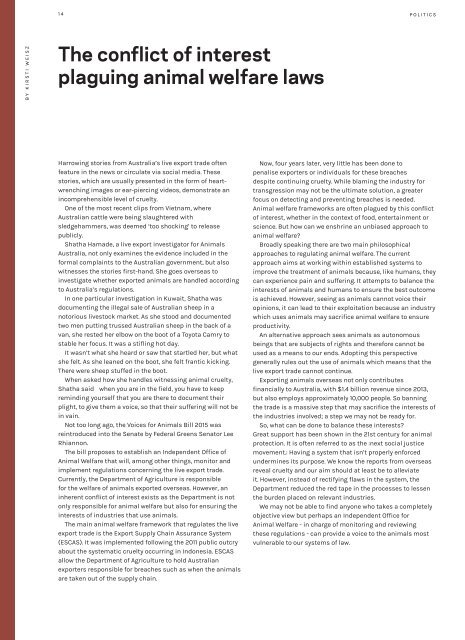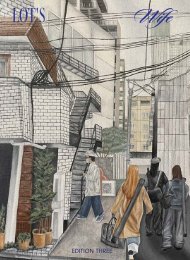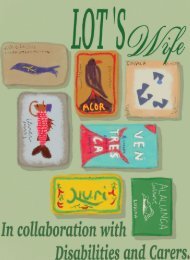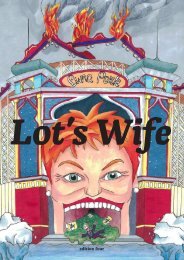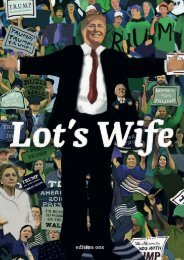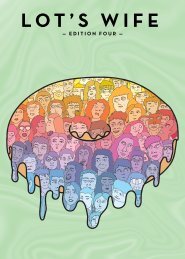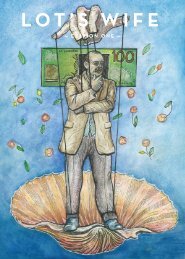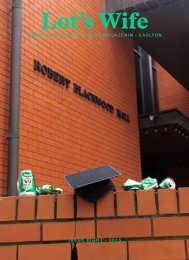Lot's Wife Edition 6 2015
Create successful ePaper yourself
Turn your PDF publications into a flip-book with our unique Google optimized e-Paper software.
14<br />
POLITICS<br />
BY KIRSTI WEISZ<br />
The conflict of interest<br />
plaguing animal welfare laws<br />
Harrowing stories from Australia’s live export trade often<br />
feature in the news or circulate via social media. These<br />
stories, which are usually presented in the form of heartwrenching<br />
images or ear-piercing videos, demonstrate an<br />
incomprehensible level of cruelty.<br />
One of the most recent clips from Vietnam, where<br />
Australian cattle were being slaughtered with<br />
sledgehammers, was deemed ‘too shocking’ to release<br />
publicly.<br />
Shatha Hamade, a live export investigator for Animals<br />
Australia, not only examines the evidence included in the<br />
formal complaints to the Australian government, but also<br />
witnesses the stories first-hand. She goes overseas to<br />
investigate whether exported animals are handled according<br />
to Australia’s regulations.<br />
In one particular investigation in Kuwait, Shatha was<br />
documenting the illegal sale of Australian sheep in a<br />
notorious livestock market. As she stood and documented<br />
two men putting trussed Australian sheep in the back of a<br />
van, she rested her elbow on the boot of a Toyota Camry to<br />
stable her focus. It was a stifling hot day.<br />
It wasn’t what she heard or saw that startled her, but what<br />
she felt. As she leaned on the boot, she felt frantic kicking.<br />
There were sheep stuffed in the boot.<br />
When asked how she handles witnessing animal cruelty,<br />
Shatha said “when you are in the field, you have to keep<br />
reminding yourself that you are there to document their<br />
plight, to give them a voice, so that their suffering will not be<br />
in vain.”<br />
Not too long ago, the Voices for Animals Bill <strong>2015</strong> was<br />
reintroduced into the Senate by Federal Greens Senator Lee<br />
Rhiannon.<br />
The bill proposes to establish an Independent Office of<br />
Animal Welfare that will, among other things, monitor and<br />
implement regulations concerning the live export trade.<br />
Currently, the Department of Agriculture is responsible<br />
for the welfare of animals exported overseas. However, an<br />
inherent conflict of interest exists as the Department is not<br />
only responsible for animal welfare but also for ensuring the<br />
interests of industries that use animals.<br />
The main animal welfare framework that regulates the live<br />
export trade is the Export Supply Chain Assurance System<br />
(ESCAS). It was implemented following the 2011 public outcry<br />
about the systematic cruelty occurring in Indonesia. ESCAS<br />
allow the Department of Agriculture to hold Australian<br />
exporters responsible for breaches such as when the animals<br />
are taken out of the supply chain.<br />
Now, four years later, very little has been done to<br />
penalise exporters or individuals for these breaches<br />
despite continuing cruelty. While blaming the industry for<br />
transgression may not be the ultimate solution, a greater<br />
focus on detecting and preventing breaches is needed.<br />
Animal welfare frameworks are often plagued by this conflict<br />
of interest, whether in the context of food, entertainment or<br />
science. But how can we enshrine an unbiased approach to<br />
animal welfare?<br />
Broadly speaking there are two main philosophical<br />
approaches to regulating animal welfare. The current<br />
approach aims at working within established systems to<br />
improve the treatment of animals because, like humans, they<br />
can experience pain and suffering. It attempts to balance the<br />
interests of animals and humans to ensure the best outcome<br />
is achieved. However, seeing as animals cannot voice their<br />
opinions, it can lead to their exploitation because an industry<br />
which uses animals may sacrifice animal welfare to ensure<br />
productivity.<br />
An alternative approach sees animals as autonomous<br />
beings that are subjects of rights and therefore cannot be<br />
used as a means to our ends. Adopting this perspective<br />
generally rules out the use of animals which means that the<br />
live export trade cannot continue.<br />
Exporting animals overseas not only contributes<br />
financially to Australia, with $1.4 billion revenue since 2013,<br />
but also employs approximately 10,000 people. So banning<br />
the trade is a massive step that may sacrifice the interests of<br />
the industries involved; a step we may not be ready for.<br />
So, what can be done to balance these interests?<br />
Great support has been shown in the 21st century for animal<br />
protection. It is often referred to as the :next social justice<br />
movement.: Having a system that isn’t properly enforced<br />
undermines its purpose. We know the reports from overseas<br />
reveal cruelty and our aim should at least be to alleviate<br />
it. However, instead of rectifying flaws in the system, the<br />
Department reduced the red tape in the processes to lessen<br />
the burden placed on relevant industries.<br />
We may not be able to find anyone who takes a completely<br />
objective view but perhaps an Independent Office for<br />
Animal Welfare - in charge of monitoring and reviewing<br />
these regulations - can provide a voice to the animals most<br />
vulnerable to our systems of law.


